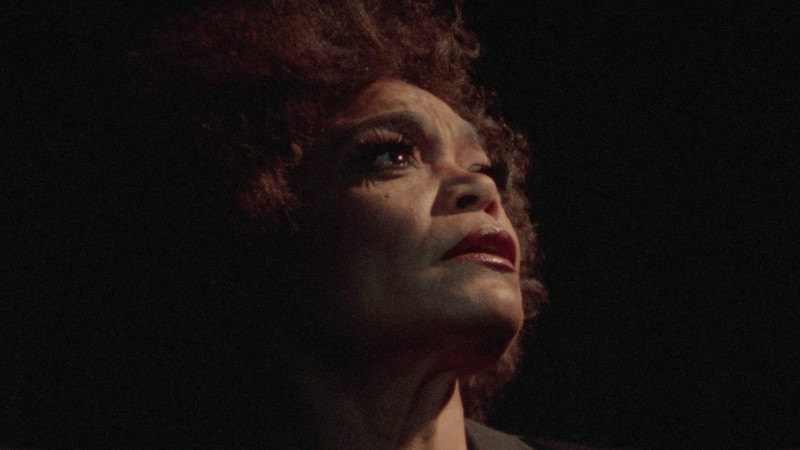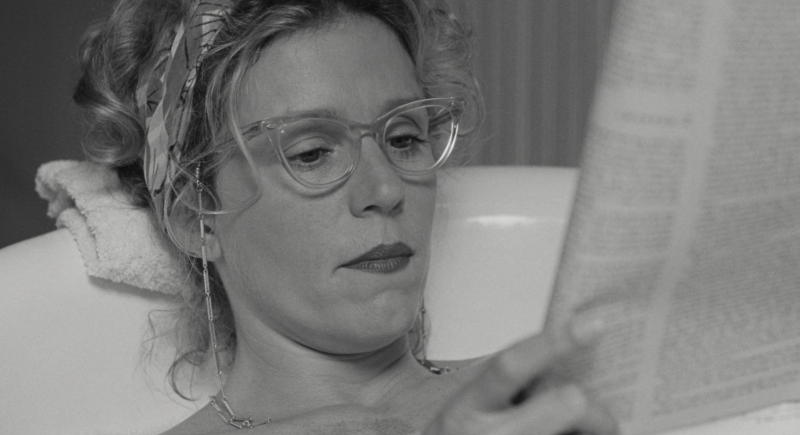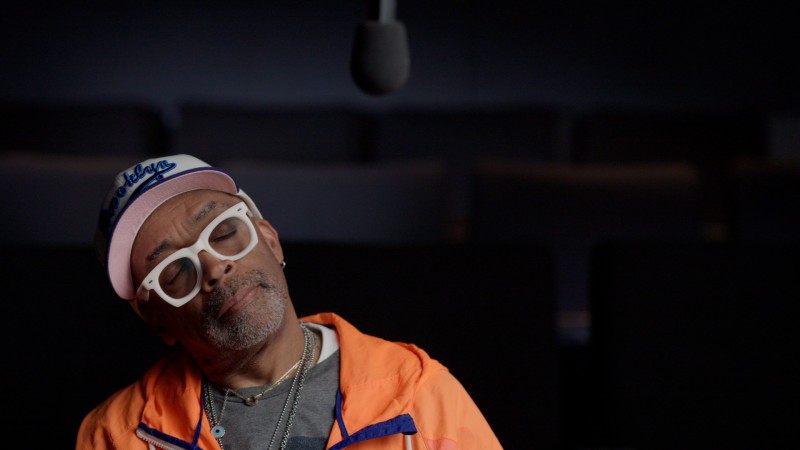
“Anyone with that kind of brilliance, you just give them space . . . She was a kind of unique, extraordinary, eccentric wild animal. And some jewels came out of her mouth.”
Richard Gere
On Halloween 1978, a month after the release of Terrence Malick’s Days of Heaven, its youngest star, seventeen-year-old Linda Manz, snapped a plastic barrette in her hair and sat down with reporter Bobbie Wygant. In archival footage, Wygant, the Barbara Walters of Dallas–Fort Worth’s Channel 5, hair sprayed and set in a dark cloud surrounding her face, introduces their brief segment, “From New York Street Kid to Hollywood Star.” She marvels at the unknown actor who was cast over Tatum O’Neal largely because—as Wygant sums it up—Manz possessed the same qualities as the character Malick had in mind: “a young, uneducated, rough-hewn child from unfortunate circumstances.” But did the actor herself know why she’d been cast? Wygant asks.
Manz simply rolls with all this, much as she had in the making of Malick’s film. “Well, they think I’m a natural,” she tells Wygant, her precociously husky New-York-tough accent instantly finding a swaggering rhythm. “I was born in the streets, I grew up in the streets, and I know everything that’s going on in the streets.” You can picture her climbing up on a Texas Panhandle–bound boxcar, falling into her own opening narration from the film: “We used to roam the streets, looking for adventuhs.”
“So you were part of the streets?” Wygant says.
“Well,” Manz pauses, like an improv actor buying valuable seconds of time. “Kind of.”
“You ever been busted?” Wygant ventures hopefully.
“Uh-uh. No. I always chicken outta those things. Like if the kids are gonna go rob something, I say, see you later.”
And if she wasn’t in the movies?
“Probably I’d be in the streets or in a grave,” Manz says, breaking into a big smile. “Probably be murdered by those kids.”

Vague and mythic, “the streets” and “those kids” nonetheless seemed to be exactly what Wygant wanted to hear. Perhaps she had taken notice of the scar skating down the bridge of Manz’s nose and the one just below her right eye, and imagined their origin stories. As they sign off, Manz still beaming, Wygant’s voice-over soberly intones: “While Hollywood has destroyed some young lives, it seems to be a salvation for Linda Manz, keeping her off the streets.”
It was easier perhaps, for Wygant, to paint Manz as a naif—better for the story—but it was a story Manz participated in too. All her work is marked by an instinct for the truth that sometimes arises in embellishment, and in the visceral joyousness of invention. On the surface her upbringing wasn’t as rough as it was made out to be, but these tales got at the dark and deadpan truth that is at the heart of all of Manz’s performances. Malick claims to have discovered her in a laundromat. Perhaps he really did. Even from a young age, Manz seemed to inhabit multiple worlds. She was enrolled in drama and dance classes at Charlie Lowe’s Broadway Show Business School for Kids in Carnegie Hall and grew up on East Seventy-Eighth Street, between First and Second Avenues. Her mother worked as a cleaner in the Twin Towers of the World Trade Center.
“I was raised by my mother and my grandmother,” Manz told me when I called her in California in 2014 for a story that ran on T magazine’s website, tied to a screening of Dennis Hopper’s 1980 nihilistic punk film Out of the Blue. “My mother used to take me to the Metropolitan Museum of Art, she took me to Central Park, she took me ice skating at Rockefeller Center, she took me to Radio City Music Hall for the Christmas shows and the Easter shows, and we probably had some of that good New York Chinese food!”
So much for lack of culture. I’ve since imagined a fantasy tour of the museum led by Manz describing Goya and Rembrandt and Cassatt and Degas; Linda Manz on The Death of Socrates would have to be equal to what she did for Days of Heaven. Her voice, which I characterized in the story I wrote then as “cigarettes and asphalt,” in truth contains so much more: all the silt and dirt and the strange and joyous and tragic grit of life.
On set, Malick would later confess, Manz had often eluded him. “I feel like I have not been able to grasp a fraction of who she really is,” he said in a rare 1979 interview. But Malick’s instinctive way of working—the magic-hour shoots, his method of directing the crew to suddenly shift gears and film, say, a flock of birds passing overhead—was in so many ways not so different from Manz’s. She’d forget her lines, but she would also transform them, marvelously, revealing the surreal ironies within them just as Malick’s spur-of-the-moment noticings led to some spectacular cinematography. (“Every time I gave her new lines, she interpreted it in her own way,” Malick said. “[W]hen she refers to heaven and hell, she says that everyone is bursting into flames.”)
“Terry told me early on he wanted to make a silent film and I knew what he meant,” Sam Shepard says in an interview that accompanies Criterion’s edition of Days of Heaven. Shepard had been lured by Malick off his own ranch in northern California to play the part of the rich, brooding, dying farmer whose land Manz and Brooke Adams and Richard Gere’s migrant characters work. Not silent, perhaps—it’s hard to think of Days without the trains and the clanging and the labor and Ennio Morricone’s score—but largely wordless. It wasn’t working.
At an impasse two years into editing the film, Malick called in Manz and let her riff, recording as the film unspooled. He was drawing on a voice-over technique he had previously used in Badlands, which features flat, diaristic narration from another precocious teenage girl.
Manz’s narration, raw and direct and dreaming, supplied him with the story that was missing, its necessary humor, its fatalistic wizened edge. It pulls Days of Heaven down to earth but also hovers above it, floating in and out of the action, sometimes in the midst of it, often omniscient enough to glimpse the hidden dangers lurking on a sky-blue horizon, the fire behind the sunset, the ghosts that only a child can see. Malick regretted all he left on the cutting floor, but the result is a remarkable edit.
Transcribed, it amounts to less than twelve hundred words—a standalone oblique and haunted monologue that lies somewhere between the bloodshot verse of Arkansan poet Frank Stanford and the no-nonsense delivery of Mattie Ross, the young, hard-bitten heroine of Charles Portis’s True Grit. Threaded into Malick’s sublime skies and wheat fields, it becomes something else, intuiting the terror below those ecstatic surfaces. Manz knew the world and the people in it were torn (“You got half devil and half angel in you”) and she ad-libs delightfully, inventing a guy named Ding-Dong whose Rapture vision she recounts: “The mountains are going to go up in big flames. The water’s going to rise in flames. There’s going to be creatures running every which way, some of them burnt, half their wings burnin’. People are going to be screamin’ and howlin’ for help.” Her words lurk beneath idyllic footage of elk herds and clouds, but when the fires and locusts arrive, you start to wonder if maybe Ding-Dong is vindicated.
Sometimes the voice is pure hobo poetry, matched to Malick’s Wyeth-esque lonesome houses and fields. “I got to like this farm,” Manz says. “Do anything I want. Roll in the fields. Talk to the wheat patches. When I was sleeping, they’d talk to me. They’d go in my dreams.”
“In all my movies I’m just being myself,” she told me. “I just ad-libbed everything. With Days of Heaven, I came in and did all the voice-overs. I made all that stuff up. It wasn’t hard, there wasn’t any pressure. I was just having fun.”
After Days, five-foot-two Manz played Peewee, a diminutive tough in The Wanderers (1979);she was cast in the TV show The Orphan Train and a handful of other early-eighties roles, and finally in Hans Christian Andersen’s Snow Queen, as interpreted for Shelley Duvall’s Faerie Tale Theatre. It’s a shame and a mystery that more parts didn’t come her way then. “I kinda got lost in the shuffle of being in the movies because I didn’t have an agent at the time and things were slow and . . . I dunno,” Manz said in a Village Voice interview with Nick Pinkerton in 2011.
In the intervening years, she moved to California, married cameraman Bobby Guthrie, and had three kids. In 1997, when Harmony Korine brought Manz back on-screen for Gummo, her performance was weird and fearless and funny and gruff, a jumpstart moment, reintroducing her to a new generation. Korine rightly called her “one of the top five screen presences of all time—right up there with Lillian Gish and Gena Rowlands.” But after Gummo and David Fincher’s The Game, Manz disappeared from the public eye almost as quickly as she’d reentered it.
When I tracked her down in 2014, Linda Manz was living in a small community in the mountains north of Los Angeles, a shrimp-puff-cooking young grandma with rebellious irreverence intact. She didn’t make it into LA much. She told me she was teaching her three-year-old granddaughter how to tap dance the way she had been taught as a child (“a tomboy learning to tap dance!” is how she remembered her own first lesson), the way she had done in her movies. “We were tapping all over the place yesterday!”
A Chihuahua barked in the background. She was surrounded by her movies. “I got ’em all right here,” she said proudly. She could still recite her best lines. From Dennis Hopper’s Out of the Blue, playing the Elvis-worshipping Cebe (pronounced CB), hollering at passing trucks: “Subvert normality!” or “I saved your life today.” “How?” “I killed a shit-eating dog.”
So much can be said of Manz’s voice, but she was an expressive and captivatingly physical actor too. When she visits her father (Hopper) in prison, she presses her face to the glass with such intense feeling and force you imagine she could launch herself through it; when Richard Gere’s character is shot in Days of Heaven, an uncontrollable shake courses through her body like an electric shock. In her best scene in Harmony Korine’s Gummo, tough and bizarre and tender, she descends into a junk-strewn basement in hot pink short-shorts, pulls a gun on her silent, unyielding son (“If you don’t smile I’m going to kill you!”), tap dances and chicken struts and poses in too-large men’s shoes.
Of all her characters—that tap-dancing mom, the tiny gangster Peewee in The Wanderers, the wannabe “mud doctor” Linda of Days of Heaven, and others—Out of the Blue’s Cebe remained her favorite. (A new restoration of the film was set to debut at South by Southwest in March.) When filming wrapped for Gummo, she gave the custom jacket she’d worn in it, embellished with Elvis’s name on the back, to costar Chloë Sevigny. She modeled Cebe after James Dean, she told me. “James Dean, James Dean, James Dean, he was it for me! I’ve always been a tomboy. I’d wear jeans, white shirts, rolled up with the cigarettes right under the sleeve!”
“How much of Cebe was you?” I asked her.
“Probably 100 percent.”
“How so? Would you have described yourself as punk?”
“Not at all, I was into disco!”
“But Cebe’s whole mantra is ‘Disco sucks’!”
“Hahahaha!” I loved Linda’s laugh.
“So maybe you were 99 percent Cebe?”
“Hahahaha!” she cracked up again.
“’Cause Cebe was into Elvis, Johnny Rotten . . .”
“I loved disco. Donna Summer, the Bee Gees! I loved Barry Manilow! Barbra Streisand!” Manz said. “I used to go to discos all the time. I went everywhere. I went to Studio 54 . . . I got in because they got me in.” She didn’t recall who “they” were, but around this time pictures appeared of her with Brooke Shields and with Matt Dillon (who’d just made his own debut as sleeveless punk Richie in the suburban teen rebellion movie Over the Edge). Her version of punk—what she transferred to Cebe—was a feeling: “Attitude,” she said. “Just strong-willed, strong emotion.”

When Linda added me as a friend on Facebook, I felt a little starstruck and was compelled to log in more often. Sometimes we exchanged messages there. She reliably posted songs by Barry Gibb, but Barry White was another perennial favorite, as were Al Green, Laura Branigan, and clips from Soul Train—dance music. On her profile she listed her education experience as the School of Hard Knocks, and the University of Life, and I could picture her laughing as she did it, and it was also true. She was online frequently, but having a physical copy to hold in your hand still means more and she asked if I could send her the piece and I said I would. I made color copies and mailed them to her address in California. I imagined maybe I’d get to meet her there someday.
Sometime after that story, the director Jeffrey Peixoto asked if I could put him in touch with Linda for a music video he was making. That video never came out, but he sent me footage he’d shot, a brief dazzle of Linda’s family shooting off fireworks in the yard, Linda holding a grandchild and smiling as embers dance past. She was in her midfifties by then; she looked older, but also timeless. By then, he said, she relied on both cigarettes (no judgment) and an oxygen tank, and gamely joked she should voice the part of a Disney witch. This would have no doubt thrilled her grandchildren, not to mention the rest of us who miss her tremendously and, in the wake of her too-early death at fifty-eight, rewatch her brief, blazing output.
I knew Manz had become sick and had some emergency hospital visits earlier this year. She was open about some of the heartaches in her life, especially the recent death of one of her sons, in a motorcycle accident. Still I thought she’d outlive cancer, as she had so many other things. “I’ll always be that character,” she’d told me of playing Cebe. “I’m just a tough little rebel, I guess. A survivor, that’s what you’d call me.” I imagined her escaping too, in some version of the way the Linda of Days of Heaven does, the classic knotted-bedsheets-out-the-window move. In the film, it’s cast as an inevitable event. This kid is half raised in open air; she’s just seen fire and plague and murder and she’s expected to go to boarding school? This time she brings along a young rebel comrade who lights a smoke, speaks as tough as Manz (“fuh” for “fur”). Outside, Manz cartwheels down the gray streets, instantly at home again on the railroad tracks, her words mingling with Morricone’s score as they liberate themselves, disappearing into a gray but widening horizon.
This girl, she didn’t know where she was goin’ or what she was gonna do.
She didn’t have no money on her.
Maybe she’d meet up with a character.
I was hoping things would work out for her.
She was a good friend of mine.
More: Features

Galatea’s Revenge: Actresses Talk Back
In a collection of behind-the-scenes documentaries now playing on the Criterion Channel, legendary female performers assert their agency over their screen personae and find freedom in the glamour and artifice of their profession.

A Year’s Worth of Essential Reading
As we come to the end of 2025, we’re looking back at some of the essays and interviews we’ve shared with you over the past year.

Room Tone 2025
Celebrate the holiday season with this special treat from our production team.

Dying Worlds: Adoor Gopalakrishnan’s Dramas of Cosmic Disorder
The director of Rat Trap and Monologue was an uncompromising artist who helped establish the Indian state of Kerala as a hub of bold political filmmaking.
